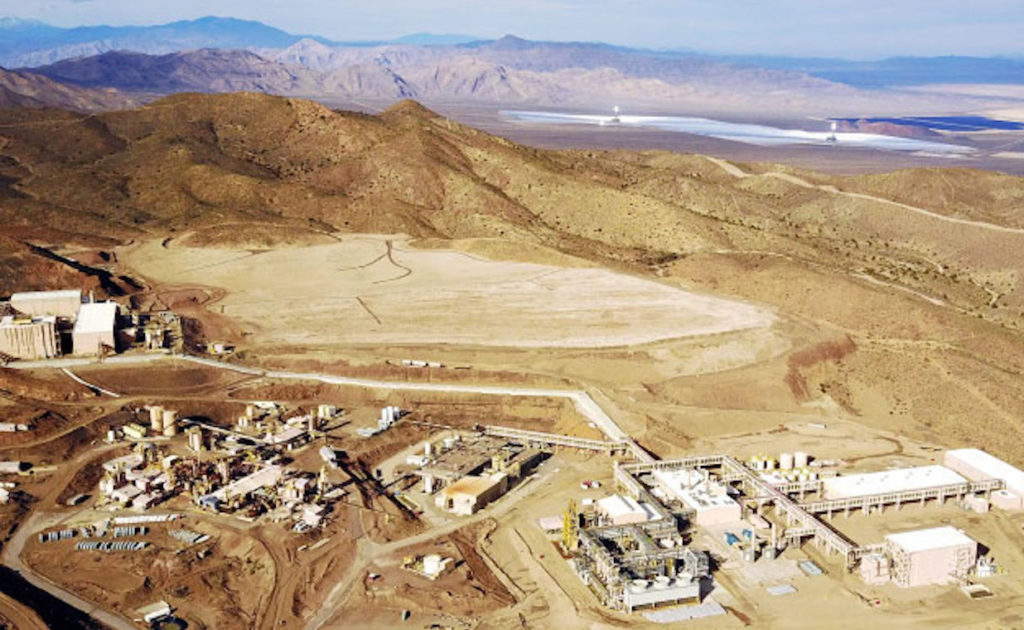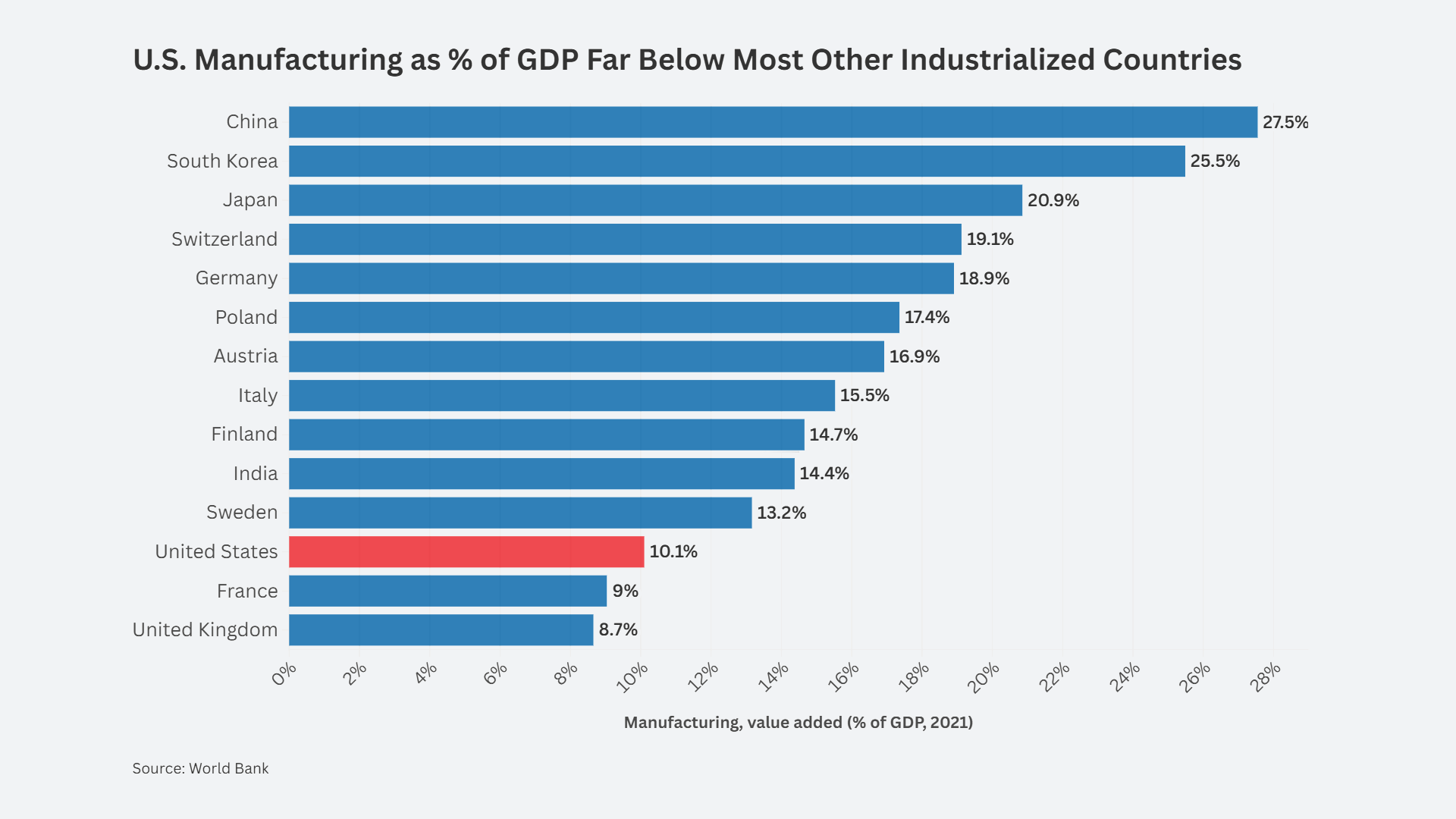America’s dependence on China for rare earth supplies is one of the most serious issues for the U.S. supply chain. Rare earths are critical minerals with uses in military equipment such as fighter jets. On the civilian side, rare earths are required for the motors in electric vehicles, a market that is destined to be huge in just a few years. Today China dominates the rare earths industry, accounting for the processing of over 90% of global supply. It doesn’t take much imagination to think of how damaging the situation could become for the U.S. in the event of a confrontation over Taiwan.
Five years ago, the U.S. appeared to be in a near-hopeless situation in rare earths, with virtually zero domestic mining or processing capability. But since then, the situation has begun to look much more hopeful, thanks to one company, MP Materials, supported first by the Trump administration and now the Biden administration. The U.S. now has a large, profitable rare earths mining operation in California, and MP Materials is investing a further $700 million to restore rare earth separation capabilities to Mountain Pass and to build a metal and magnet production facility in Texas with General Motors as a committed customer.
However, the situation is still precarious at present, as MP Materials depends on Chinese processors for rare earth processing. Equally important, the U.S. still lacks the ability to produce heavy rare earths, which are also required for the permanent magnets used in most rare earth applications. MP Materials is today successfully mining rare earths and producing rare earth concentrate in California.
In 2017, the sole U.S. rare earth mine at Mountain Pass, California, was lying idle. Its owner Molycorp, Inc. had filed for bankruptcy in 2015. Although Mountain Pass sits on top of one of the world’s richest deposits of rare earths, the U.S. lost its ability to bring up the minerals profitably as the industry was offshored from the 1990s on. MP Materials, led by finance professionals, acquired the company out of bankruptcy in 2017.
Last year, MP Materials produced 42,400 tons of rare earths contained in concentrate. That is a huge amount and the highest annual primary production in U.S. history. Consider that only a few pounds of valuable rare earths are needed in the magnets inside the actuators that enable an F-35 fighter jet to fire its high-speed missiles. Equally important, last year, MP Materials booked $332 million in revenue, up 147% on 2020, and reported net profit of $135 million, for an impressive profit margin of 41%. That profit margin helped enable MP to raise an additional $690 million to bolster the company’s balance sheet.
“We have spent five years optimizing the processing infrastructure to begin separating and refining rare earths at the site,” MP Materials Senior Vice-President of Communications & Policy Matt Sloustcher told us. “We have made important changes to the flow sheet to optimize the production of rare earths, improving the economic and environmental footprint of the process. We believe we have solved many of the problems that plagued our predecessor.” Financial analysts add that MP Materials benefited from Department of Defense contracts on the order of $45 million and, more importantly, an atmosphere of crisis in the global market for critical minerals that pushed up the price of rare earths, improving MP Materials’ profitability. But there is no doubting the management skill and smart strategic choices that are apparent in MP Materials’ stunning financial report of its 2021 results.
In April this year, MP Materials and General Motors announced a partnership in which MP would “supply rare earth materials, alloy, and magnets to support GM’s all-electric vehicle programs.”[1] This partnership will give the U.S. its first complete supply chain for rare earths-to-motors-to-EVs. GM will use MP Materials magnets in its Ultium motors. The carmaker has said it will build the motors at a Toledo facility that now manufactures conventional transmissions for internal combustion vehicles.
This complete supply chain offers a slew of benefits for the United States, including domestic producers and consumers. First, it will strengthen U.S. national security by eliminating dependence on China for rare earth processing and magnet manufacturing. Second, it reduces shipping costs. Current China to North America west coast freight rates are on the order of $3,000 a container. Reduction in shipping brings with it a reduction in associated emissions. Further, U.S. production of pure, isolated rare earths and magnets will undoubtedly be cleaner than the comparable processes in China.
A shift to domestic manufacturing will also ensure that rare earth processing and magnet production properly meets U.S. standards, not just for greenhouse gases but for other safety and quality standards.
Big Challenges Remain
Unfortunately, issues within the rare earth sector still exist and have not been ameliorated by MP’s substantial progress. The biggest single issue involves America’s lack of heavy rare earth refining capacity. Two of the four light rare earths, neodymium and praseodymium, make up around 99% of the typical NdFeB permanent magnet’s rare earth content, along with iron and boron. But for high-temperature permanent magnets, around 1% of the contained rare earth content is comprised of two heavy rare earths dysprosium and terbium.
“China accounts for 60% of heavy rare earth mining, and 100% of the processing of heavy rare earths,” managing director Ryan Castilloux of Adamas Intelligence told us.
Mountain Pass, rich in light rare earths, received a Pentagon award in February 2022 to create the first commercial processing operation for heavy rare earths outside of China. Australia’s Lynas Rare Earths also received Pentagon support to build a Texas heavy rare earth processing facility.MP Materials and Lynas have indicated that these processing facilities will be designed to accept rare earths mined elsewhere, in part to boost domestic supply of refined heavy rare earths. Other U.S. companies are looking at other U.S. locations where heavy rare earths could be mined profitably. Outside China, the bulk of the world’s heavy rare earths come from mines in Myanmar, a politically unstable nation that is close to China.
This situation must be resolved as a high priority in the next couple of years, especially in light of skyrocketing demand from the auto industry as all the promised EV models are supposed to reach the market in the next couple of years.
In addition, the U.S. is very far from having enough capacity to produce the magnets needed for the fast-growing EV motor market. MP Materials’ Texas manufacturing facility will have capacity for the magnets for about 500,000 motors, Sloustcher says. Yet as the U.S. auto market moves to EVs, there could be a need for magnets for upwards of 20 million motors. Two other companies, USA Rare Earths and Quadrant Magnetics are investing in magnet manufacturing facilities, in Oklahoma and Kentucky, respectively. Other companies planning to get into the U.S. magnet manufacturing business include Noveon and Vacuumschmelze of Germany. Last year, Vacuumschmelze announced an agreement to supply GM with magnets and said its magnet facility would be operational in 2024, employ hundreds of workers, and use “locally sourced raw materials.”[2]
Sloustcher of MP Materials says the federal government should enact production tax credits for rare earth metal and magnet manufacturing, just as the Biden administration recently did for the mining and refining of critical minerals. “The 10% production tax credit for critical mineral production is an effective way to level the playing field for domestic producers,” Sloustcher says.
One piece of legislation that addresses this challenge comes from Rep. Eric Swalwell (D-CA) and Guy Reschenthaler (R-PA), co-chairs of the Critical Materials Caucus. Their bill, recently introduced into the Senate by Senator Catherine Cortez Masto (D-NV) would provide a $20 per kilogram production tax credit for magnets that are manufactured in the U.S. with an increased credit of $30 per kilogram for magnets manufactured in the U.S. whose components are produced, recycled, or reclaimed domestically.[3] Looking at the promising industry reaction to production tax credits in other sectors, this bill could be a powerful step towards boosting magnet manufacturing in the U.S.
Another problem on the mining side is the difficulty of launching new mines in the U.S. Even if new rare earth sources are identified, there is uncertainty about the ability of the private sector to bring them up profitably. “Rare earths are not rare, but high grade, economic deposits are exceedingly rare. Securing permits in the U.S. takes a very long time, it can be seven to 15 years,” says MP’s Sloustcher. “That is a tremendously long time compared to other countries.”
Big problems remain, especially if most or all of the 17 million automobiles Americans buy do become EVs within the timeframe some industry and political leaders are talking about. But for the first time in decades, there does seem to be a new determination to rebuild American mining and manufacturing industry. The measures in the recently passed Inflation Reduction Act, including support for production tax credits for critical minerals and consumer tax credits for U.S.-made EVs, have been embraced by many in U.S. industry as a reason to rebuild American industry.
Says Matt Sloustcher: “MP Materials has made significant progress in our mission to restore the full rare earth supply chain to the United States. We want to be part of the renaissance of American manufacturing.”
Footnotes
[1] MP Materials Begins Construction on Texas Rare Earth Magnetics Factory to Restore Full U.S. Supply Chain, April 21, 2022, Retrieved October 6, 2022, from here.
[2] Announcement from General Motors and VACUUMSCHMELZE, Dec. 9th, 2021, Retrieved Oct. 5, 2022 from here.
[3] Cortez Masto introduces bill to strengthen domestic rare-earth magnet supply chain. U.S. Senator Catherine Cortez Masto of Nevada. (2022, July 29). Retrieved October 3, 2022, from here.













